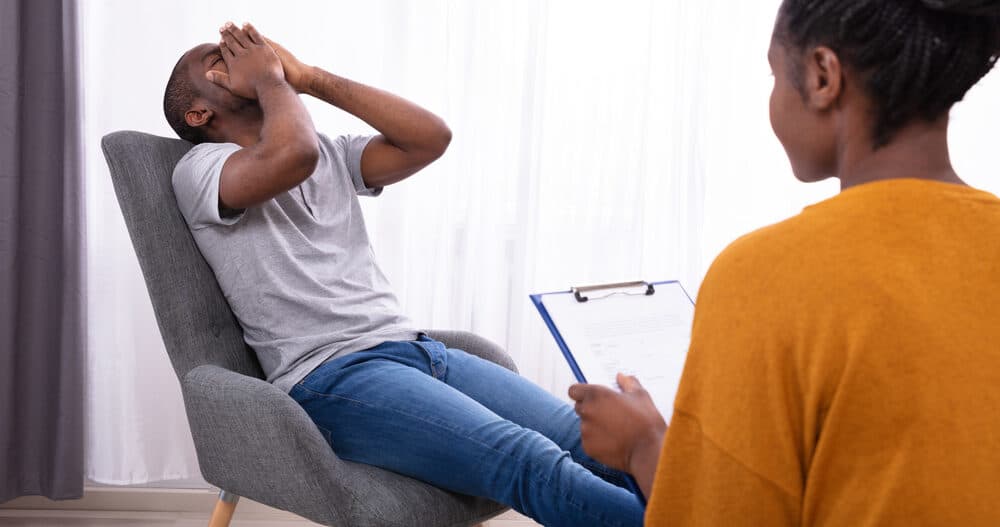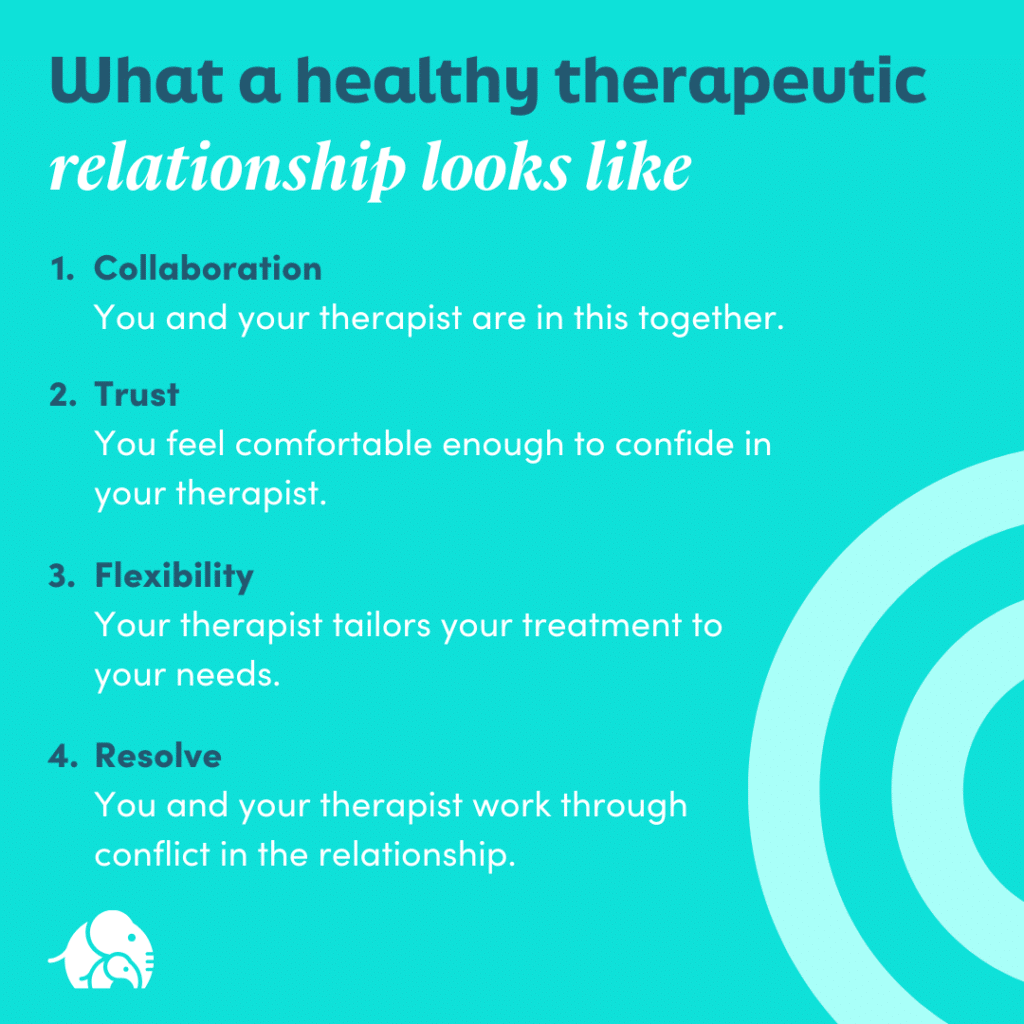Breaking up with your therapist can be a difficult but sometimes necessary thing to do. Whether you knew the relationship was doomed from the start or it was one of those “it’s not you, it’s me moments,” sometimes things just don’t work out. Or maybe you found a therapist you really connected with but had to part ways because of something out of your control, like the practice closing, schedule changes, or moving to a new area or state.
The truth is, that no matter the reason or how long the relationship lasted, breaking up with your therapist can leave you feeling anxious, disappointed, and maybe a bit hopeless. Taking the first step toward getting mental health care can be so hard, and if it doesn’t go as planned, you might start to believe that therapy doesn’t work or that it’s just not helpful for you.
If you’ve had a bad experience with therapy in the past, it can be difficult to open up again and seek the care you need. Here’s a few reasons why you should consider giving therapy another go.
Not sure how to find the right therapist for your unique needs? Click the link below and get matched with the right therapist for you today!
Why Finding the Right Therapist Is So Important
Finding a therapist that’s right for your unique background, personality, and needs can take some time. It’s okay if the first few tries are no-gos. You need to make sure the vibe is right, and if you still don’t feel comfortable with your therapist after the first few sessions, it will likely hurt your progress.
That’s because several studies have concluded that the one of the main factors that determines the success of therapy is the therapeutic relationship. While a therapist’s experience level and education background are important to consider, at the end of the day, finding a therapist that you like and have a great relationship with is one the most important indicators that your time spent in therapy will actually help you.
What Determines a Good Therapeutic Relationship?
A good relationship with a therapist, often called a “therapeutic alliance,” is thought to be built on several core aspects. These include:
- Collaboration: A therapy session shouldn’t feel like a lecture. You and your therapist are on this journey together. From defining goals to finding solutions, you should feel on equal grounds and play an active role in the therapy process.
- Trust: Clients who don’t trust their therapist might withhold information or lie about feelings or “homework” completion. Part of this is because most people struggle with being vulnerable. If you and your therapist set a goal and you fall short of that benchmark, you might feel embarrassed. You might also struggle to trust your therapist won’t judge you for certain feelings or actions. However, if you build a relationship with a therapist that you come to trust and feel comfortable with, you’re more likely to confide in them. This only allows your therapist to provide you the best care possible.
- Flexibility: It might be difficult to find a therapist just like you. While you might feel you need to find a therapist that matches your race, gender, sexual orientation, political party, and religious beliefs, that’s not necessarily the case. On one hand, finding a therapist that shares a similar background or values as you can be comforting and make it easier to connect. However, many therapists are empathetic and skilled at tailoring their treatment to specific backgrounds and treatment needs.
- Resolve: The likelihood is that there are going to be rough patches in your relationship with your therapist. Your therapist is human after all, and they might not always understand your feelings or give the response you were hoping for. Since issues, big or small, are unavoidable in therapy, a therapeutic relationship can be strengthened by addressing those issues and working through them.
Processing a Bad Therapy Experience
If you’re still recovering from a negative or even painful therapy experience, it can help to reflect on what went wrong. As you process and learn from the experience, ask yourself these questions:
What were your expectations going into therapy?
If this was your first time going to the therapist, it’s likely you came to your first session with certain expectations – about therapy, mental illness, and psychiatric medication. These expectations can be shaped by what you’ve read about therapy, what others have told you about their experiences, or even TV and books. It can be startling if your therapist interacts with you in a way that is very different from what you expected.
Did your therapist do something ethically wrong?
Like we said earlier, therapists are human too. And while we know that most people who choose to become therapists do so with the intention and desire to help others, this doesn’t describe everyone in the profession. It can be very upsetting if you had a therapist who crossed boundaries, handled your confidential information poorly, gave dishonest information about their background, or mishandled your money.
Did you feel uncomfortable or judged by your therapist?
In a healthy therapeutic relationship, the goal is that you feel comfortable enough with your therapist to confide in them and entrust them with your care. If you just can’t cross this barrier after several sessions – some people say six sessions is the magic number – then breaking up with your therapist could be a wise choice. However, this doesn’t mean you’ll never find a therapist you connect with and feel you can trust. And it also helps to recognize that therapy isn’t always comfortable. Getting deep and sharing the traumatic, dark, shameful things you hold inside can be painful, even if it encourages growth and healing in the long run.
Was your therapist a poor fit?
Your old therapist might have been a friendly, qualified, all-around great therapist. But they need to be the right fit for you. Maybe you feel more comfortable working with a therapist that has a similar background to you – which can mean they are the same gender, religion, or race. Maybe you need a therapist that specializes in a specific type of therapy or in treating specific conditions or issues. For example, if you are seeing a therapist for processing trauma, finding a therapist who can provide EMDR might be beneficial for your treatment plan.
Your old therapist might have been a friendly, qualified, all-around great therapist. But they need to be the right fit for you. Maybe you feel more comfortable working with a therapist that has a similar background to you – which can mean they are the same gender, religion, or race. Maybe you need a therapist that specializes in a specific type of therapy or in treating specific conditions or issues. For example, if you are seeing a therapist for processing trauma, finding a therapist who can provide EMDR might be beneficial for your treatment plan.
Finding the Courage to Begin Again
Starting a new relationship after a messy breakup is scary. We invest a lot of time, effort, and emotion in building new relationships and hope for the best. So when they fail, it can take a lot of courage to try again.
It’s the same with finding a new therapist. Your mental health is so important to your overall well-being. If you’ve been struggling with chronic stress, anxiety, depression, PTSD, a personality disorder, or any other mental health issue, it can feel like some deep, dark secret you hold on to. Over time, mental illness may become so rooted in your life that it becomes your identity. Reaching out for help and sharing that struggle with someone else can be one of the hardest things you ever choose to do.
Of course, you want it to work out the first time around. No one wants to make that daunting first step toward recovery only to be let down, but having the courage to try again is worth it. With therapy, you can find the resources, guidance, and medical expertise necessary to live a full life without feeling like you’re constantly carrying a mental illness on your shoulders.
Get Matched With a Therapist That’s Just the Right Fit
At Ellie Mental Health, we want you to experience the freedom that comes with finally being able to let go, learn to love yourself, and grow with a therapist that really gets you. We understand the heartbreak and frustration that comes with a bad therapy experience or unsuccessful treatment. We know it’s a big ask, but please, please, please give therapy another try!
To help mitigate the stress that comes with finding a new therapist, we’re here to help you find just the right match. Our Client Access Team will take the time to get to know you – and we mean really get to know you. We go beyond the whole “give your name and email” process and will take time to figure out what you need and want from a therapist. From here, our CATs will pair you with the right provider. It’s like a really great dating site but for finding a therapist – we’ll do the “fun” matchmaking work for you so that you end up with a provider that checks all the right boxes.
Ready to let our expert therapist-client matchmakers get to work? Click the link below and get matched with the right therapist for you today!



